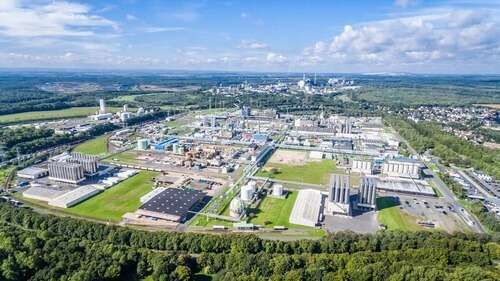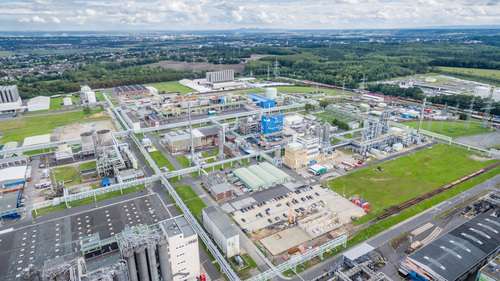EEW Explores CO₂ Capture Facility as Part of the EEW CaReS Project in Knapsack – Potential for Climate Protection and Negative Emissions
With the EEW CaReS Knapsack project, EEW Energy from Waste GmbH, together with strong partners, is exploring the possibility of capturing CO₂ from waste incineration. The goal is to identify a potential pathway toward climate neutrality. A feasibility study is currently underway – a promising approach whose realization will, however, depend significantly on political and financial framework conditions. During a visit by Dr. Georg Kippels, Member of the German Bundestag (CDU) for the Rhein-Erft district, Thomas Okos, Member of the State Parliament of North Rhine-Westphalia (CDU) and full member of the Committee on Economy, Industry, Climate Protection and Energy, as well as representatives of the Carbon Management Alliance (CMA), EEW and its project partners provided an update on the current status of the potential project at the site in the Knapsack Chemical Park.
Technology for tomorrow – from the heart of the Rhineland As part of the feasibility study, the development of a CO₂ capture facility with a capacity of up to 300,000 tons per year at EEW’s Refuse-Derived Fuel Power Plant (EBKW) in Hürth is being examined. The EBKW processes up to 320,000 tons of non-recyclable household and commercial waste each year. The energy generated is supplied as process steam and electricity to industrial companies in the chemical park.
The captured CO₂ could be transported out of the chemical park via new infrastructure and permanently stored.
Cross-industry partnership for climate protection To advance the project idea, EEW is working with strong partners: • YNCORIS GmbH & Co. KG – Operator of the site infrastructure and co-owner of the EBKW • SEFE Securing Energy for Europe – International energy company focused on energy security and decarbonization • OGE Open Grid Europe GmbH – One of the largest gas network operators in Europe and a developer of CO₂ transport pipelines in Germany
The partnership covers the entire CO₂ value chain. In addition, the project could contribute to the formation of a cluster of emitters in the Cologne metropolitan region, thereby fostering the development of a viable infrastructure for CO₂ transport and storage.
Waste-to-Energy as a potential source of negative emissions A significant portion of the waste processed – around 50% – is of biogenic origin. If this CO₂ is captured and stored, real negative emissions can be achieved. This could allow waste-to-energy to evolve from a source of residual emissions into an active tool for climate protection, contributing to the goal of making Germany climate-neutral by 2045 and climate-negative from 2050 onward.
Industry signals willingness – political action required “With EEW CaReS Knapsack, we want to work with our partners to explore how CO₂ capture and storage can be technically feasible and economically viable at a waste-to-energy facility. However, for this project to become a reality, we need reliable political framework conditions. Only with the right political support can the necessary investments be triggered. This project is a prime example of how crucial a coordinated expansion of infrastructure and regulation is for the decarbonization of waste treatment,” emphasizes Timo Poppe, CEO of the EEW Group.
Political support from the constituency “As the Bundestag representative for the Rhein-Erft district, I am pleased about this flagship project in our region. EEW CaReS Knapsack combines climate protection with securing our economic future – it deserves support at all political levels,” says Dr. Georg Kippels, Member of the Bundestag.
Outlook EEW CaReS Knapsack is currently assessing the technical and economic feasibility of CO₂ capture at a waste-to-energy facility in Germany. Further project implementation requires the establishment of the necessary legal, technical, and economic framework conditions in Germany.
Categories
Chemical substances
Countries
Companies
Latest news
INEOS launches €250m investment supported by the French Government to secure the future of French industry at Lavera
The project marks the first phase of a long-term regeneration plan to reduce emissions, boost reliability, efficiency and competitiveness, with support of the French State.
Hycamite’s technology to decarbonize shipping awarded AiP by industry leader DNV
Kokkola Industrial Park →Hycamite’s proprietary Thermo-Catalytic Decomposition (TCD) technology offers a new approach to producing clean hydrogen by breaking down methane, the primary component of liquefied natural gas (LN...
Clariant catalysts will power the Ecoplanta: Europe's first waste-to-methanol plant
Chemmed Cluster Tarragona →Repsol is building Europe’s first plant to produce renewable methanol from urban waste The facility will use Enerkem gasification technology to produce 240 KTA of methanol Clariant will supply cata...
Lilly plans to build a new $3 billion facility to boost oral medicine manufacturing capacity in Europe for patients worldwide
Netherlands site will bring 500 manufacturing and 1,500 construction jobs while further strengthening Lilly's global supply chain



